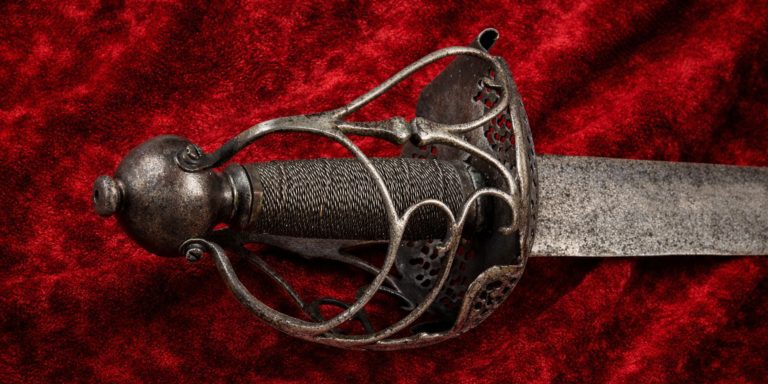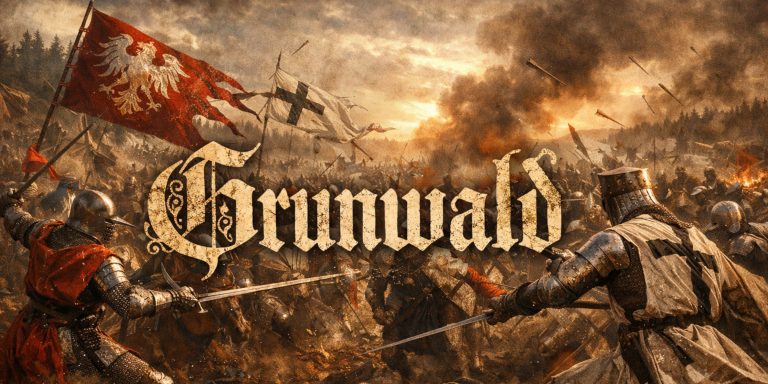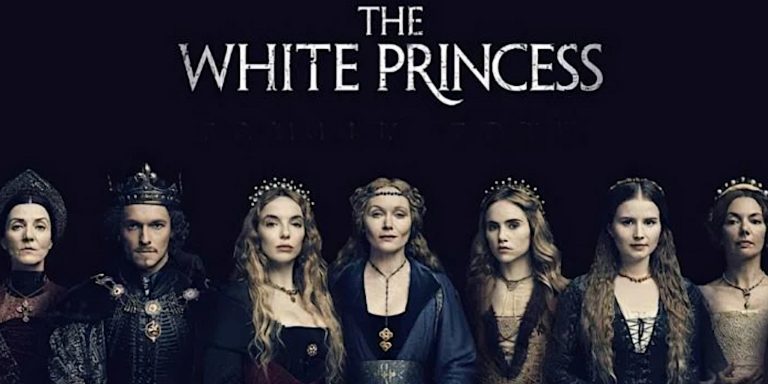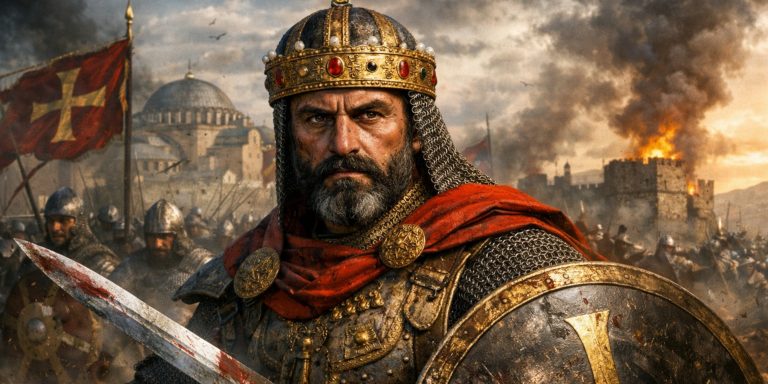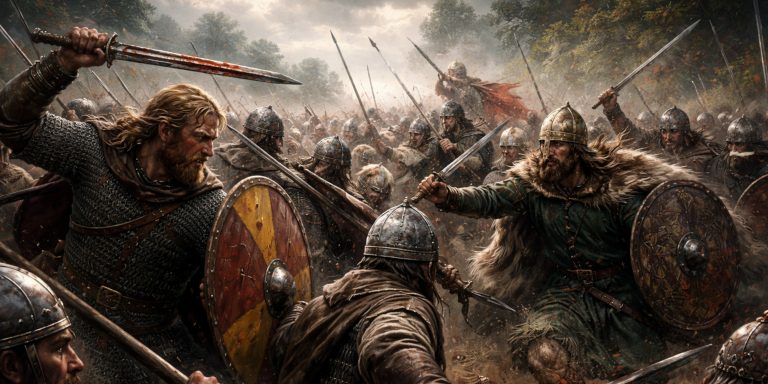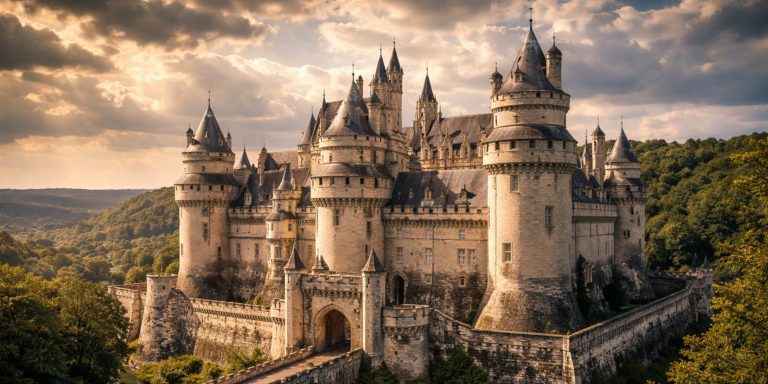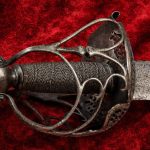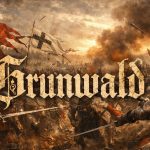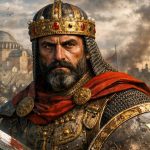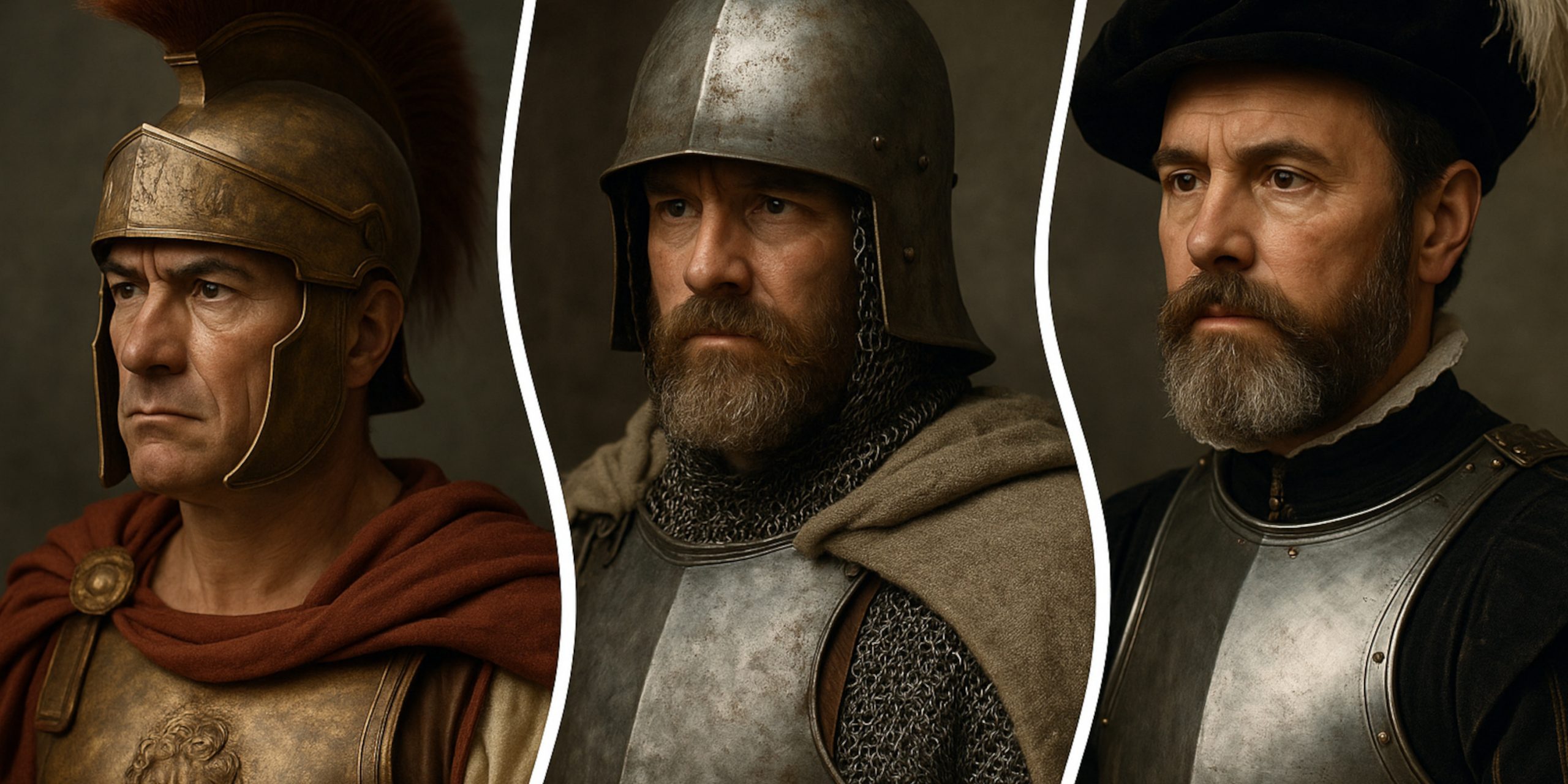
Across millennia of warfare, certain individuals have stood out not just for their battlefield prowess, but for how they shaped the course of nations, cultures, and empires. From the disciplined phalanxes of ancient Mesopotamia to the sweeping cavalry charges of the Napoleonic era, military leadership has remained central to the rise and fall of civilisations.
Each section is organised by era, highlighting how leadership styles and strategic demands evolved over time. Some of these figures ruled vast empires. Others rose from obscurity to become the scourge of more powerful foes. A few were ultimately defeated, but left a lasting mark through their courage, innovation, or sheer persistence. Together, they reflect the changing face of warfare across five thousand years of recorded conflict.
Ancient Era
| Sargon of Akkad | Founder of the Akkadian Empire and one of history’s earliest known military leaders. |
| Thutmose III | Egyptian pharaoh who expanded Egypt’s empire to its greatest territorial extent. |
| Ramses II | Led the Egyptians at the Battle of Kadesh and oversaw vast military and architectural projects. |
| Tiglath-Pileser III | Reformed the Assyrian army and expanded the empire through ruthless conquests. |
| Ashurbanipal | Last great king of Assyria, known for campaigns against Elam and the vast royal library at Nineveh. |
| Cyrus the Great | Founded the Persian Empire and respected the cultures of the lands he conquered. |
| Cambyses II | Conquered Egypt and expanded Persian rule into Africa. |
| Darius I | Organised the Persian Empire and led campaigns into Greece and the Indus Valley. |
| Xerxes I | Led the second Persian invasion of Greece, including battles at Thermopylae and Salamis. |
| Leonidas I | Spartan king famed for his last stand at the Battle of Thermopylae. |
| Themistocles | Athenian admiral who masterminded the Greek naval victory at Salamis. |
| Pausanias of Sparta | Led the Greek forces to victory over Persia at the Battle of Plataea. |
| Pericles | Athenian statesman and general who strengthened Athens’ empire during the Peloponnesian War. |
| Brasidas | Spartan commander known for bold campaigns during the Peloponnesian War. |
| Epaminondas | Theban general who broke Spartan dominance at the Battle of Leuctra. |
| Pelopidas | Theban leader and close ally of Epaminondas, key in defeating Sparta. |
| Philip II of Macedon | Father of Alexander and unifier of Greece through diplomacy and warfare. |
| Alexander the Great | Conquered the Persian Empire and extended Greek influence to India. |
| Chandragupta Maurya | Founded the Maurya Empire in India after overthrowing the Nanda dynasty. |
| Ashoka | Expanded Maurya territory and later promoted Buddhism following the Kalinga War. |
| Pyrrhus of Epirus | Hellenistic general whose costly victories gave rise to the term ‘Pyrrhic victory’. |
| Hannibal Barca | Carthaginian commander who famously crossed the Alps to fight Rome. |
| Hasdrubal Barca | Brother of Hannibal, led Carthaginian forces in Iberia before being defeated in Italy. |
| Hamilcar Barca | Father of Hannibal and key figure in the First Punic War. |
| Scipio Africanus | Defeated Hannibal at Zama, ending the Second Punic War. |
| Scipio Aemilianus | Destroyed Carthage in the Third Punic War and captured Numantia. |
| Gaius Marius | Roman general who reformed the legions and defeated the Germanic tribes. |
| Lucius Cornelius Sulla | Seized power in Rome and led successful campaigns in the East. |
| Pompey Magnus | Roman general who cleared the Mediterranean of pirates and conquered the East. |
| Julius Caesar | Expanded Rome through the Gallic Wars and became dictator after civil war. |
| Mark Antony | Caesar’s ally and rival to Octavian, notable for campaigns in Egypt. |
| Marcus Agrippa | Roman admiral and strategist, won the Battle of Actium. |
| Germanicus | Popular Roman general who avenged the Teutoburg disaster. |
| Arminius | Cherusci leader who destroyed three Roman legions in the Teutoburg Forest. |
| Boudica | Led a major revolt against Roman rule in Britain. |
| Vespasian | Roman general who crushed the Jewish revolt and later became emperor. |
| Trajan | Expanded the Roman Empire to its greatest extent. |
| Septimius Severus | Strengthened Roman borders and campaigned in Britain and the East. |
| Shapur I | Sassanid king who defeated and captured the Roman emperor Valerian. |
| Zenobia of Palmyra | Led a rebellion against Rome, conquering much of the Eastern empire. |
| Aurelian | Restored the Roman Empire by defeating Palmyra and other breakaway states. |
| Constantine the Great | Legalised Christianity and reunified the Roman Empire under his rule. |
| Julian the Apostate | Roman emperor who attempted to restore paganism and led campaigns in Persia. |
| Stilicho | Roman general who defended the Western Empire against Gothic invasions. |
| Flavius Aetius | Defeated Attila the Hun at the Battle of the Catalaunian Plains. |
| Attila the Hun | Feared leader of the Huns who invaded the Eastern and Western Roman Empires. |
| Genseric | Vandal king who sacked Rome and established a kingdom in North Africa. |
| Theodoric the Great | Ostrogothic king who ruled Italy after defeating Odoacer. |
| Belisarius | Byzantine general under Justinian who reconquered parts of the Western Empire. |
| Narses | Byzantine general who completed the reconquest of Italy after Belisarius. |
Early Medieval Era
| Clovis I | Frankish king who united Gaul and converted to Christianity. |
| Justinian II | Byzantine emperor who launched military campaigns to restore lost territory. |
| Heraclius | Defeated the Persians and reorganised the Byzantine military structure. |
| Khalid ibn al-Walid | Arab general who won over a hundred battles during the early Islamic conquests. |
| Amr ibn al-As | Conquered Egypt for the Rashidun Caliphate. |
| Tariq ibn Ziyad | Led the Muslim conquest of Visigothic Spain. |
| Charles Martel | Defeated the Umayyad Caliphate at the Battle of Tours. |
| Pepin the Short | Carolingian ruler who expanded Frankish territory and established royal legitimacy. |
| Charlemagne | Expanded the Carolingian Empire and was crowned Emperor of the Romans. |
| Offa of Mercia | Powerful Anglo-Saxon king who fortified Mercia and built Offa’s Dyke. |
| Egbert of Wessex | First king to rule a united Anglo-Saxon England. |
| Alfred the Great | Defended Wessex from Viking invasions and reformed its military. |
| Edward the Elder | Expanded English control over the Danelaw. |
| Athelstan | Defeated a coalition of Scots and Vikings at the Battle of Brunanburh. |
| Otto I the Great | Holy Roman Emperor who defeated the Magyars at Lechfeld. |
| Bolesław I of Poland | Expanded and consolidated the Polish state. |
| Basil II | Byzantine emperor who crushed the Bulgarians and expanded imperial borders. |
| Harald Bluetooth | United Denmark and Norway and converted them to Christianity. |
| Olaf Tryggvason | King of Norway known for forced Christianisation and naval warfare. |
| Svein Forkbeard | Conquered England and ruled as king of Denmark and Norway. |
| Cnut the Great | Ruled over a North Sea empire including England, Denmark, and Norway. |
| Harald Hardrada | Veteran of the Varangian Guard who died invading England in 1066. |
| Macbeth of Scotland | Scottish king with a notable military career, later mythologised by Shakespeare. |
| Brian Boru | Unified Ireland and defeated Viking forces at the Battle of Clontarf. |
| Gorm the Old | First historically recognised king of Denmark. |
| Al-Mansur of Al-Andalus | Led over 50 military campaigns across Christian Spain. |
| Abd al-Rahman III | Emir and later Caliph of Córdoba who secured dominance over Iberia. |
High Medieval Era
| Genghis Khan | Founded the Mongol Empire and led devastating campaigns across Asia. |
| William the Conqueror | Led the Norman invasion of England and won the Battle of Hastings. |
| Robert Guiscard | Norman adventurer who conquered southern Italy and Sicily. |
| Godfrey of Bouillon | Leader of the First Crusade and defender of Jerusalem. |
| Bohemond I of Antioch | Norman prince and commander during the First Crusade. |
| Baldwin I of Jerusalem | First king of the Crusader Kingdom of Jerusalem. |
| Alexios I Komnenos | Byzantine emperor who appealed for the First Crusade. |
| El Cid | Castilian nobleman who fought both for and against Muslim rulers in Spain. |
| Henry I of England | Consolidated Norman power and led successful campaigns in Normandy. |
| Matilda of Tuscany | Led military campaigns supporting the Pope during the Investiture Controversy. |
| David I of Scotland | Expanded Scottish power and introduced Norman feudalism. |
| Saladin | United Muslim forces and recaptured Jerusalem from the Crusaders. |
| Richard the Lionheart | Led the Third Crusade and fought Saladin to a stalemate. |
| Frederick Barbarossa | Holy Roman Emperor who led a major campaign during the Third Crusade. |
| Philip Augustus | French king who fought against England and participated in the Crusades. |
| William Marshal | Renowned knight and military commander under four English kings. |
| John of Brienne | Crusader king of Jerusalem and military leader in the Latin Empire. |
| Simon de Montfort | Led the baronial revolt in England. |
| Andrew II of Hungary | Led Hungarian forces in the Fifth Crusade. |
| Alexander Nevsky | Russian prince who defeated the Swedes and the Teutonic Knights. |
| Subutai | Mongol general who orchestrated campaigns from Eastern Europe to China. |
| Batu Khan | Grandson of Genghis who led Mongol invasions of Europe. |
| Möngke Khan | Mongol ruler who expanded the empire into the Middle East and South Asia. |
| Baibars | Mamluk Sultan who defeated Mongols and Crusaders alike. |
| Edward I of England | Conquered Wales and fought extensive campaigns in Scotland and France. |
| Llywelyn ap Gruffudd | Welsh prince who resisted English conquest. |
| James I of Aragon | Expanded his kingdom through conquests in the Balearic Islands and Valencia. |
| Alfonso X of Castile | Fought Muslims in Iberia and supported crusading efforts. |
| Louis IX of France | Led the Seventh and Eighth Crusades and died on campaign. |
| Yaroslav II of Vladimir | Fought Mongol invasions and defended Russian principalities. |
Late Medieval Era
| Michael VIII Palaiologos | Byzantine emperor who recaptured Constantinople from the Latin Empire. |
| Edward III | Revived English claims in France and began the Hundred Years’ War. |
| Edward the Black Prince | Won major victories at Crécy and Poitiers during the Hundred Years’ War. |
| Bertrand du Guesclin | French commander who led guerrilla resistance against the English. |
| Charles V of France | Restored French fortunes during the Hundred Years’ War. |
| John Hawkwood | English mercenary leader famed for his campaigns in Italy. |
| Henry V of England | Won the Battle of Agincourt and renewed English claims in France. |
| Joan of Arc | French heroine who lifted the Siege of Orléans and inspired national resistance. |
| Gilles de Rais | French noble and military leader who fought alongside Joan of Arc. |
| Jan Žižka | Bohemian general who pioneered field artillery and defeated crusading armies. |
| Sigismund of Luxembourg | Led efforts to suppress the Hussites and reform the Church. |
| Ladislaus the Posthumous | King of Hungary and Bohemia with several military campaigns. |
| Skanderbeg | Led Albanian resistance against the Ottoman Empire. |
| Vlad the Impaler | Fought the Ottomans with brutal tactics, inspiring the Dracula legend. |
| Mehmed II | Conquered Constantinople and expanded the Ottoman Empire. |
| Constantine XI Palaiologos | Died defending Constantinople against the Ottomans in 1453. |
| Louis the Great of Hungary | Led campaigns across Central Europe and the Balkans. |
| John Hunyadi | Regent of Hungary who defended Europe against Ottoman incursions. |
| Stephen III of Moldavia | Fought off Ottoman, Hungarian, and Polish invasions. |
| Ivan III of Russia | Laid foundations for the Tsardom and ended Mongol dominance. |
| Philip the Good | Expanded Burgundian territory and played a major role in the Hundred Years’ War. |
| Bayezid I | Ottoman sultan who expanded the empire before his defeat by Timur. |
| Tamerlane (Timur) | Conqueror who devastated Persia, India, and Central Asia. |
| Tokhtamysh | Khan of the Golden Horde who fought Timur for control of Central Asia. |
| Ulugh Beg | Timurid ruler and astronomer who also commanded military campaigns. |
| Alfonso V of Aragon | Expanded Aragonese rule in the Mediterranean. |
| Afonso V of Portugal | Led campaigns in North Africa and claimed Castile. |
| Ferdinand of Aragon | Unified Spain and conquered Granada with Isabella. |
Early Modern Era
| Charles the Bold of Burgundy | Aggressive nobleman whose ambitions reshaped France-Burgundy relations. |
| Babur | Founded the Mughal Empire after victory at Panipat. |
| Akbar the Great | Expanded and consolidated Mughal control over India. |
| Shah Abbas I | Strengthened the Safavid military and reclaimed Persian territory. |
| Suleiman the Magnificent | Led the Ottomans at their territorial height across Europe, Asia, and Africa. |
| Selim I | Doubled Ottoman territory through campaigns in Egypt and the Levant. |
| Francis I of France | Fought the Habsburgs in a series of Italian Wars. |
| Charles V (Holy Roman Emperor) | Ruled over much of Europe and fought both Ottomans and Protestants. |
| Gustavus Adolphus | Revolutionised warfare and led Sweden to prominence in the Thirty Years’ War. |
| Maurice of Nassau | Pioneer of linear tactics in early modern warfare. |
| John III Sobieski | King of Poland who saved Vienna from Ottoman siege in 1683. |
| Henri IV of France | Ended the French Wars of Religion and modernised the army. |
| Alessandro Farnese | Duke of Parma and brilliant commander in the Eighty Years’ War. |
| Albrecht von Wallenstein | Imperial general during the Thirty Years’ War. |
| Oliver Cromwell | Parliamentary commander in the English Civil War and leader of the New Model Army. |
| James Graham, Marquis of Montrose | Royalist general who won major victories in Scotland. |
| Frederick William, the Great Elector | Built Brandenburg-Prussia’s military power. |
| Prince Eugene of Savoy | Led Habsburg forces in wars against the Ottomans and France. |
| Louis II de Bourbon, Prince of Condé | Won the Battle of Rocroi and fought in the Fronde. |
| Marshal Turenne | One of France’s greatest generals under Louis XIV. |
| Tokugawa Ieyasu | Unifier of Japan and founder of the Tokugawa shogunate. |
| Toyotomi Hideyoshi | Warlord who unified Japan and invaded Korea. |
| Oda Nobunaga | Paved the way for Japan’s unification with ruthless campaigns. |
| Yi Sun-sin | Korean admiral who defeated the Japanese with innovative naval tactics. |
| Nurhaci | Founder of the Qing dynasty who united the Jurchen tribes. |
| Shah Jahan | Led Mughal military campaigns while commissioning the Taj Mahal. |
| Murad IV | Ottoman sultan who restored order and led campaigns in Persia. |
| Ahmed III | Oversaw Ottoman conflicts with Russia and Austria. |
| Don Juan of Austria | Led the Holy League fleet to victory at Lepanto. |
| William of Orange (the Silent) | Led the Dutch Revolt against Spanish rule. |
| Charles XII of Sweden | Fought the Great Northern War with early success. |
| Peter the Great | Modernised Russia and led it to military dominance in the Baltic. |
| Marshal Villars | French commander in the War of the Spanish Succession. |
| Claude de Villars | Victorious French general who served under Louis XIV. |
| Duke of Marlborough | Led Allied forces to major victories in the War of the Spanish Succession. |
| Maurice de Saxe | Marshal of France known for tactical brilliance. |
| James FitzJames, Duke of Berwick | Led French forces and won the Battle of Almanza. |
Napoleonic Era
| Napoleon Bonaparte | French emperor and military genius who dominated European warfare in the early 19th century. |
| Michel Ney | Marshal of France known for his bravery and leadership during the Napoleonic Wars. |
| Joachim Murat | Cavalry commander and king of Naples, famed for his flamboyance and daring charges. |
| Jean Lannes | Trusted marshal of Napoleon, killed at Aspern-Essling while leading from the front. |
| Louis-Nicolas Davout | The ‘Iron Marshal’, undefeated in battle and a key figure at Auerstedt and Wagram. |
| André Masséna | French marshal known as ‘the dear child of victory’, notable for campaigns in Italy and Portugal. |
| Jean-de-Dieu Soult | Marshal of France who fought in Spain and later served as a statesman. |
| Nicolas-Charles Oudinot | French general who was wounded multiple times and excelled in secondary commands. |
| Jean-Baptiste Bernadotte | Marshal of France who became King of Sweden and later opposed Napoleon. |
| Auguste de Marmont | Napoleonic marshal who surrendered Paris in 1814, earning scorn from Bonapartists. |
| Gebhard Leberecht von Blücher | Prussian field marshal whose forces helped defeat Napoleon at Waterloo. |
| Arthur Wellesley, Duke of Wellington | British general who defeated Napoleon at Waterloo after a lengthy Peninsular campaign. |
| Horatio Nelson | Royal Navy admiral who secured British naval supremacy at Trafalgar. |
| Carl von Clausewitz | Prussian officer and military theorist active during the Napoleonic Wars. |
| Prince Schwarzenberg | Austrian general who commanded coalition forces at Leipzig and Paris. |
| Archduke Charles of Austria | One of Napoleon’s most capable adversaries, defeated him at Aspern-Essling. |
| Mikhail Kutuzov | Russian general who adopted a scorched earth policy and defeated Napoleon in 1812. |
| Pyotr Bagration | Brave Russian general mortally wounded at Borodino. |
| Levin August von Bennigsen | Russian general who fought Napoleon at Eylau and Friedland. |
| Barclay de Tolly | Russian commander during Napoleon’s invasion, emphasised strategic withdrawals. |
| Francisco de Castaños | Spanish general who defeated the French at the Battle of Bailén. |
| José de Palafox | Spanish general who defended Zaragoza during the Peninsular War. |
| Rowland Hill | Reliable British general under Wellington, fought in the Peninsular and at Waterloo. |
| Thomas Picton | British commander killed at Waterloo after a distinguished Peninsular War career. |
| William Beresford | Anglo-Portuguese commander who reformed the Portuguese army and led them in battle. |

